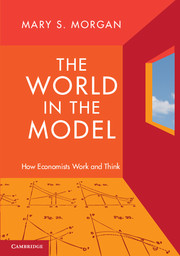Book contents
- Frontmatter
- Contents
- Figures, Tables, and Boxes
- Preface
- 1 Modelling as a Method of Enquiry
- 2 Model-Making: New Recipes, Ingredients, and Integration
- 3 Imagining and Imaging: Creating a New Model World
- 4 Character Making: Ideal Types, Idealization, and the Art of Caricature
- 5 Metaphors and Analogies: Choosing the World of the Model
- 6 Questions and Stories: Capturing the Heart of Matters
- 7 Model Experiments?
- 8 Simulation: Bringing a Microscope into Economics
- 9 Model Situations, Typical Cases, and Exemplary Narratives
- 10 From the World in the Model to the Model in the World
- Index
- Plate Section
- References
4 - Character Making: Ideal Types, Idealization, and the Art of Caricature
Ideal Types, Idealization, and the Art of Caricature
Published online by Cambridge University Press: 05 November 2012
- Frontmatter
- Contents
- Figures, Tables, and Boxes
- Preface
- 1 Modelling as a Method of Enquiry
- 2 Model-Making: New Recipes, Ingredients, and Integration
- 3 Imagining and Imaging: Creating a New Model World
- 4 Character Making: Ideal Types, Idealization, and the Art of Caricature
- 5 Metaphors and Analogies: Choosing the World of the Model
- 6 Questions and Stories: Capturing the Heart of Matters
- 7 Model Experiments?
- 8 Simulation: Bringing a Microscope into Economics
- 9 Model Situations, Typical Cases, and Exemplary Narratives
- 10 From the World in the Model to the Model in the World
- Index
- Plate Section
- References
Summary
Introduction
Economics is about people and their actions. But economists have found that it is as difficult to figure out the economic motivations and behaviour of individuals as to make an analysis of the whole economy. And, though each person is only one small unit in the overall economy, the individual cannot be neglected for his or her behaviour creates exchange, markets, and the aggregate economy. When we search for accounts of the individual’s economy, we quickly find that over the past two centuries economists have created a series of economic man portraits, a veritable gallery of economic heroes, each fashioned to fit the style and content of the economics of their day. Whereas early characters appear as descriptions with recognisable human passions, later characters became more shadowy for their design was more clearly driven by the needs of economists’ theories. These successive models of economic man were represented initially in verbally drawn sketches, and later in terms that were informed by and fitted to mathematical notions. During the process, economists began to refer to these model people with symbols, and, as we have learnt from the last chapter, labelled them anonymously and interchangeably as X and Y, or A and B. We can treat these as models inasmuch as each one offers a well defined portrait of individual motivations or behaviour strictly limited to the economic sphere. We are dealing here, not with the development of a small world, but with a model person, someone who in some respects appears thinly described but in others appears a caricature: an economic man, not a full man.
- Type
- Chapter
- Information
- The World in the ModelHow Economists Work and Think, pp. 136 - 171Publisher: Cambridge University PressPrint publication year: 2012



